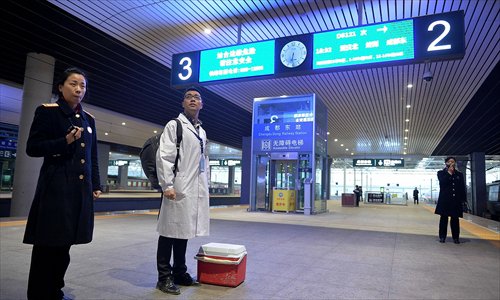HOME >> CHINA
Transplant transport
By Li Ruohan Source:Global Times Published: 2016-3-28 20:28:01
New aviation rules make it easier to move organs around the country

A doctor waits for a train to Chongqing with a donated liver in Chengdu, Sichuan Province in February 2015. Photo: IC
China is suffering from a dire organ shortage, with only 7,721 organs donated in 2015 but 300,000 patients in need of new body parts every year. This problem is made worse by the fact that some organs are rendered unusable by the country's inefficient organ transport system."Many organs are unusable because the delivery takes too long," Chen Jingyu, a leading lung transplant surgeon and deputy head of the Wuxi People's Hospital in East China's Jiangsu Province, told the Global Times on Thursday.
Chen and his team gave a 71-year-old man a new lung on Sunday, and the delivery process went smoothly due to a notice issued by the Civil Aviation Administration of China (CAAC) on February 25.
The CAAC notice aims to make it easier to quickly transport organs, and says airlines should train their staff to give priority to doctors with organs when they check in, go through security checks and deplane.
Many airline companies including China Eastern Airlines, told the Global Times that they have been working on detailed plans to fully implement the CAAC notice, as the situation differs between different companies and different organs.
Also a National People's Congress deputy, Chen suggested to the country's top legislature that a "fast track" in the aviation, rail and high-speed road sectors should be developed for organ delivery, so as to shorten journey times and ensure more organs are fresh on arrival.
Every minute counts
According to the CAAC notice, airlines can ask air traffic controllers to give priority to planes that are carrying organs.
Chen and his team carried a lung on a Shandong Airlines flight from Qingdao, East China's Shandong Province and landed in Shanghai half an hour ahead of schedule on March 18 due to the coordination of airlines.
Wu Wanyuan, publicity director of Shandong Airlines told China Central Television that they told air control authorities to make sure that the flight would take off on time and also applied for a more direct flight route.
Donated lungs and hearts should be delivered in less than eight hours as the organs will be ineffective if they have not been transplanted within 12 hours, the Wuxi Daily reported on March 22.
Livers must also get to the hospital within 12 hours, Cai Jinzhen, a lung transplant surgeon at Tianjin First Center Hospital and visiting scholar at UCLA, told the Global Times.
Transplant surgeries take around eight hours including preparation and follow-up work, said Cai, which leaves only a short time for the delivery.
The later the organ is given to the patient, the higher the risk that the patient will suffer from weakened organ function, complications and slow recovery, said Cai.
Organs aboard
Last October, China Southern Airlines stopped Chen from boarding a plane with an organ in Guangzhou, South China's Guangdong Province as they arrived just 15 minutes before the flight departure time. The team had to change their flight to one which took off 90 minutes later.
Doctors will no longer stopped from boarding when airlines learn they are carrying an organ, after the notice, said Chen. He added that airlines and airport are very cooperative nowadays.
Doctors now only need a document to show the organ was obtained legally and does not put passengers at risk, said Chen.
An official surnamed Lin with Shandong Airlines told news site thepaper.cn that the reason some airlines are "non-cooperative" is that some doctors fail to inform the airlines about the organ in advance.
Lin said some doctors do not tell airlines that they are carrying an organ until they are already through security, which leaves no time for airlines to make the necessary arrangements.
Unlike commercial airlines that specialize in organ carriage services abroad, which are always included in medical insurance, such services in China are rare due to the high cost.
A chartered plane for an organ that originates 1,000 kilometers away from Wuxi will cost at least 250,000 yuan($38,375), almost equivalent to the total cost of the transplant, while using a normal airline will cost 10,000 yuan at most, said Chen.
Posted in: Society